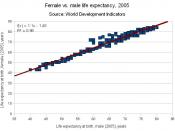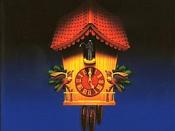Set in the days when the majestic liners were launched on the Clyde, moving from the years of depression to the devastation of the Clydebank Blitz, 'The River Flows On' shows how the main character Kate Cameron links with life's troubles and careers were like for young people in the war.
Kate Cameron was just sixteen when her world comes crashing down like many teenagers found in this time. It's 1995 and everyone is feeling the set-backs the war has give, life isn't as great as they expect it to be. Kate's life is described as many youngsters in this time.
Through this novel we go through the life of Kate Cameron, a typical teenager who lives in the time of World War I. Maggie Craig gives us an understanding of the central issues of war-time for young people, the effect created on her life and develops the main points in her life giving us the full view on war life.
At the age of sixteen we would expect to be in school and getting an education but instead of school Kate had taken on a job at a shipyard on the Clyde like most sixteen year olds in this time. Wages were needed for the rent on the house, to pay for extra food and well needed clothes and things around the house. School days suddenly came to a stop.
As we read through this novel, Maggie describes Kate's home as a 'back-street slum'. Not surprisingly this was what most families lived in. Poverty stricken families had more chance of catching a disease and dying from an illness that could have been easily cured. Many young people became seriously ill and even died making the death rate increase and the life expectancy decrease.
As the novel continues, Kate finds herself in a relationship. She shows how love can blossom in adversity. Many years ago it was common for teenagers to start a family and marry. When Kate finds out she is pregnant with her partner Jack, she also finds out he is having an affair with a girl called Marjorie. This leaving Kate to cope on her own, she is devastated. With no-one to turn to she goes back to her family. This happened to many girls. Girls would be frowned upon if they were pregnant with no ring on their finger - they usually had the name 'whore'. They were left to fend for themselves and care fro the baby, many didn't survive or else the baby died. At least Kate had her family, only the minority were so lucky.
Love blossoms again for Kate, she latterly falls in love with the boy next door Robbie Baxter, who has always loved her. He, on the other hand does not know she is pregnant therefore their whole relationship is based on a lie. As time goes by Robbie is called up for the army. This is extremely relevant to the life of young people during the war. Many families were split up because of husbands and sons going to war. This was also a reason for youngsters going to school because they either had to go to work to pay for their own way, go to war or the females had to work in their husbands' shop or the factories where the men worked.
As we find out that again Kate becomes a single mother because Robbie was shot at war. As we all would, Kate was heartbroken. Many wives and mothers lost their husbands and sons. The war had a big effect on everyone. Innocent people died from bomb attacks and shootings when all they were doing was fighting for what they were told was right - fight for King and country. Many females, like Kate were left with nothing to look forward to.
Throughout this novel we go through the different stages in Kate's life. At a very young age she experiences what adults would in this day and age. This helps us get an insight in hw young people felt and went through in order to survive and get along in life. Maggie Craig helped us with this through making us feel the set-backs war gave the young people, through making us see and interact with what war life was really like.





